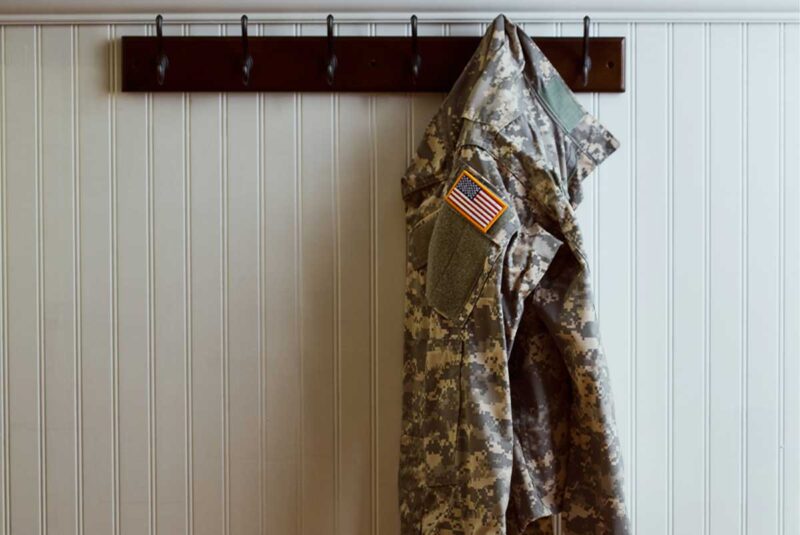Ready To Buy a Home?
Get Approved to Buy a Home
Rocket Mortgage® lets you get to house hunting sooner.
Like many Americans, U.S. military veterans and active duty service members may want to purchase an investment property. After all, real estate has proven to be one of the most lucrative investment opportunities.
As an added bonus, service members and veterans get access to VA loans, which often come with more favorable terms and fewer upfront costs than traditional mortgages. Additionally, you can use a VA loan to purchase an investment property, making it a potentially profitable opportunity for those who serve or have served in the military.
VA Home Loans: How They Work
A VA home loan is a mortgage that’s underwritten by the Department of Veterans Affairs, so a VA loan works much like a traditional loan. You’ll still be taking out a loan through a private lender, but you get the benefits of a loan backed by the VA. This means the VA will pay for a portion of the unpaid debt if you default on your loan. Plus, most VA loans don’t require a downpayment and have relaxed credit requirements.
How Can I Use a VA Home Loan To Buy a Rental Property?
As previously mentioned, VA home loans do have some restrictions that don’t apply to loans acquired directly from a private lender. Fortunately, these restrictions don’t have to stop you from buying a rental property.
Can I use my VA loan to buy an investment property?
Yes, you can use a VA loan to buy an investment property. You just have to make sure the property meets all requirements set by the Department of Veterans Affairs related to home loans.
For example, if you want to buy an investment property with a VA loan, it must be:
- A multi-unit property with 2 – 4 units
- A single-family home, where a bedroom or on-site apartment is rented out
- A primary residence the home buyer lives in, even if just one unit
The last requirement may not be ideal for many investors. You may want to buy a separate property to rent out to tenants, but to use a VA loan, you’ll also need to meet the occupancy requirement by living on the property.
Qualifying for a VA mortgage loan
The main qualifications vary depending on when you served. But most current military members or veterans will need to have been on active duty for at least 24 consecutive months – or at least 90 days for reserve members and those who were discharged early.
Assuming you meet the basic requirements to qualify, you’ll need a Certificate of Eligibility (COE), too. [1]
A COE is also known as your VA entitlement. Your entitlement shows how much the VA will guarantee on a home loan and how much you can borrow without having to make a down payment.
Full entitlement is up to $36,000 or 25% of the loan amount.[2] However, if you’re applying for a loan of more than $144,000, you could qualify for bonus entitlements.
Bonus entitlements
Bonus entitlements are calculated using the conforming loan limits in the county where you’re purchasing the property.
For example, let’s say the conforming loan limit is $800,000. To find your bonus entitlements, you divide this number by 4 and then subtract your basic entitlement (typically $36,000). This would leave you with a bonus entitlement (underwritten by the VA) of $164,000.
To ensure you can pay back your loan, the lender will also have certain requirements. In most cases, you’ll need to have a minimum credit score of 620 to secure a mortgage. Additionally, you’ll need to show proof of sufficient income to make your monthly mortgage payments. Finally, you may be required to show evidence of any assets you own that could be used as collateral.
Can I Have 2 VA Mortgages?
Contrary to popular belief, it is possible to have two VA mortgages at the same time. That said, it only applies under specific circumstances.
You can have two VA mortgages as long as you can still meet the occupancy requirement for VA loans. In other words, you’ll need two primary residences. This typically applies if you purchase one home with a VA loan, and then you’re permanently restationed to a different location.
It’s also important to note that there’s no limit to the number of times you can use the VA loan benefit during your lifetime. This means you could purchase a home with a VA loan, sell it later on and get another VA loan for your next home. Just remember, even with investment properties, you have to occupy the home to qualify for a VA mortgage.
Can I Rent Out My Home if I Bought It With a VA Mortgage?
Your ability to rent out a home that was bought with a VA mortgage will depend on the nature of the rental agreement. You’ll (almost) always need to meet the occupancy requirement, meaning you have to use the house as your primary residence. This can make renting tricky in some situations, especially if you plan to rent out the entire house.
Can I turn my VA home into a rental?
To rent out your entire home to someone, you’ll have to wait 12 months after the purchase date and still use the home as your primary residence. Alternatively, you can avoid the waiting period and occupancy requirement if the military permanently restations you to a different location.
Can I Airbnb my house with a VA loan?
The same rules apply to Airbnb guests as they do to traditional tenants. If you want to turn your entire house into an Airbnb, you’ll need to wait 12 months from the purchase date and continue using the house as your primary residence. However, if you just want to rent out a room in a single-family primary residence, you can do so via Airbnb or a standard tenant agreement.
How Can I Refinance My VA Loan To Rent My Home?
Like most mortgages, you can refinance a VA home loan for various reasons. Perhaps you want to get cash to buy a second home if you’re reassigned, take advantage of lower interest rates or rent out your home to someone else.
To qualify for VA loan refinancing, you’ll need to prove you have an existing VA home loan and you either currently occupy or have occupied the home you want to refinance.
Refinancing allows you to free up your VA entitlements without selling.
This can also help you avoid the occupancy rules of a VA loan and make renting easier. The most common refinancing option is the Interest Rate Reduction Refinance Loan (IRRRL), also known as VA streamline refinancing.
Not only can this lower your mortgage rate and free up your entitlements, but it can also allow you to switch from an Adjustable-Rate Mortgage (ARM) to a fixed-rate loan.
Refinancing from a VA loan to a conventional mortgage
In some cases, you may want to refinance a VA loan through a private lender without VA streamline refinancing. While this may not give you the favorable rates associated with VA loans and refinancing, it could still benefit you.
For example, switching from a VA loan to a conventional mortgage will free you from some of the restrictions of a VA loan (like the occupancy rule) and make it easier to use your property in different ways.
Benefits and Drawbacks of Buying Investment Real Estate With a VA Loan
Before you opt for a VA loan, you should consider the potential benefits and drawbacks. Here are some of the most important factors to consider in advance:
PROS of Buying Investment Real Estate with a VA Loan👍
VA loan rates and payment terms are usually more favorable than the rates and terms of conventional mortgages.
You can usually avoid a downpayment with a VA loan, making it easier to access a home without a lot of cash on hand.
Even if your credit is subpar, you can qualify for VA loans with terms usually reserved for people with higher credit scores.
If you follow the rules of a VA loan, you can rent out part of your property to have an additional source of income.
Service members and veterans can write off 100% of their VA loan interest payments on their annual tax filing.
CONS of Buying Investment Real Estate with a VA Loan👎
While you don’t have to make a downpayment with a VA loan, you do have to pay the VA Funding Fee, which is usually about 2.3% of the loan (though this can vary).
The Department of Veterans Affairs puts strict limits on how much you can borrow and how much the VA is willing to underwrite.
Due to the occupancy rule, you can’t use a VA loan to buy a property just for investment purposes; it will also have to serve as your primary residence.
VA home loans can only be used for residential property you’ll occupy, not a property you want to use for commercial endeavors.
New MOS: Landlord
While VA loans come with fine print that limits your ability to use a property in different ways, they can also save you a lot of money and make homeownership more accessible.
As long as you meet the VA’s occupancy requirements, you can still use your property to generate rental income.
However, remember that being a landlord is a big responsibility, and you may find it’s not a good fit for you. Consider all your options before pulling the trigger on changing your title.
Take the first step toward buying a home.
Get approved. See what you qualify for. Start house hunting.
The Short Version
- A VA home loan is a mortgage that’s underwritten by the Department of Veterans Affairs, so a VA loan works much like a traditional loan
- Yes, you can use a VA loan to buy an investment property. You just have to make sure the property meets all requirements set by the Department of Veterans Affairs related to home loans
- To rent out your entire home to someone, you’ll have to wait 12 months after the purchase date and still use the home as your primary residence
U.S. Department of Veterans Affairs. “Eligibility Requirements For VA Home Loan Programs.” Retrieved September 2022 from https://www.va.gov/housing-assistance/home-loans/eligibility/
U.S. Department of Veterans Affairs. “VA Home Loan Limits.” Retrieved September 2022 from https://www.va.gov/housing-assistance/home-loans/loan-limits/
U.S. Department of Veterans Affairs. “Interest Rate Reduction Refinance Loan.” Retrieved September 2022 from https://www.va.gov/housing-assistance/home-loans/loan-types/interest-rate-reduction-loan/




